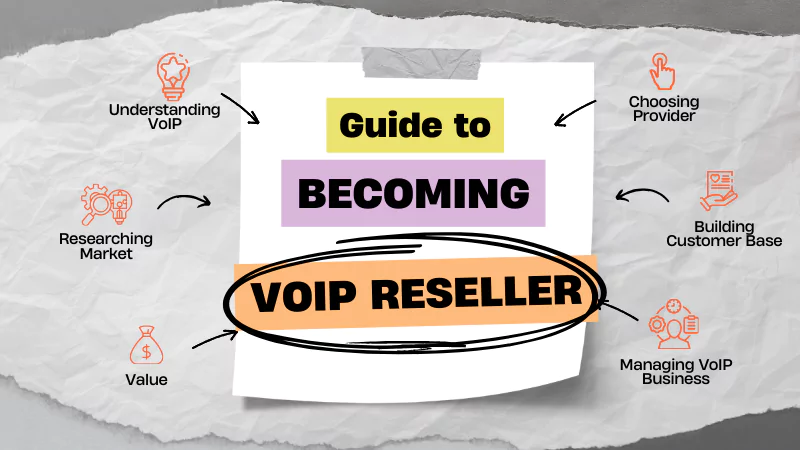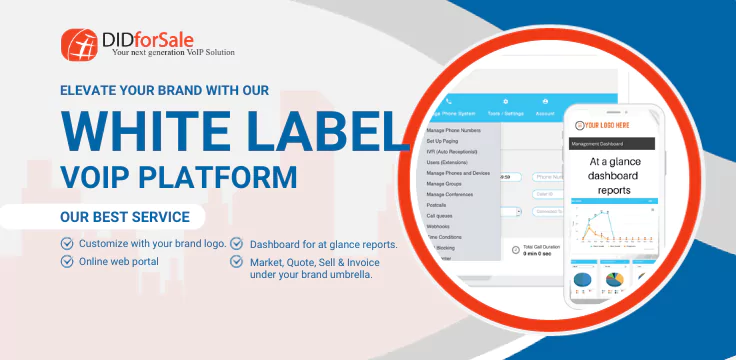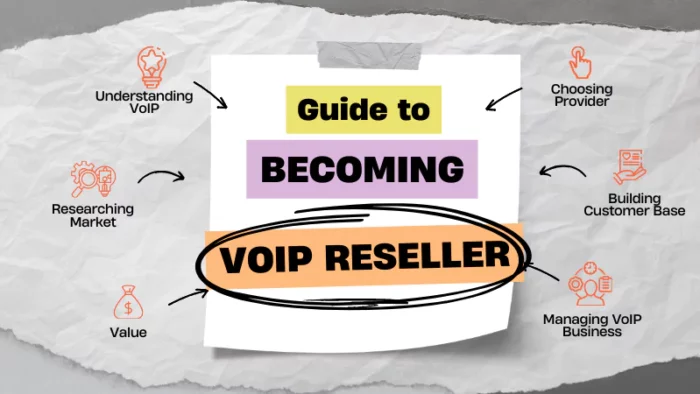Becoming a VoIP reseller can be an excellent opportunity to start your own business and provide valuable services to your customers. As a VoIP reseller, you will have the ability to sell a variety of products and services to businesses and individuals, including phone service, hosted PBX, SIP trunking, and more. However, getting started in this field can be overwhelming. This guide will provide an overview of everything you need to know to become a successful VoIP reseller.
Step 1: Understanding VoIP
Before you can become a VoIP reseller, you need to have a solid understanding of what VoIP is and how it works. VoIP stands for “Voice over Internet Protocol,” which is a technology that allows people to make phone calls over the internet. VoIP is becoming increasingly popular as businesses and individuals seek more flexible, cost-effective phone solutions.
Step 2: Researching the VoIP Market
Once you have a basic understanding of VoIP, it’s time to start researching the VoIP market. This includes understanding the different types of VoIP services and products that are available, as well as the needs of potential customers. Some key areas to research include:
-
- Different types of VoIP service providers (e.g., wholesale providers, resellers, hosted PBX providers)
There are different types of VoIP service providers that offer various services to customers. Some of the most common types of VoIP service providers include:
-
-
- Wholesale VoIP Providers: Wholesale VoIP providers offer VoIP services to other businesses and service providers at a lower cost, who then resell them to their customers.
- Retail VoIP Providers: Retail VoIP providers sell VoIP services directly to businesses and consumers. These providers offer a range of services, including SIP trunking, hosted PBX, and virtual phone systems.
- Hosted PBX Providers: Hosted PBX providers offer cloud-based phone systems that allow businesses to manage their phone systems without having to purchase or maintain expensive equipment.
- VoIP Resellers: VoIP resellers purchase services from wholesale providers and then sell them to end customers. This type of provider offers a low-cost entry into the VoIP market, as resellers do not need to invest in expensive infrastructure.
- Mobile VoIP Providers: Mobile VoIP providers offer services that allow users to make and receive calls using their mobile devices over the internet. These providers often offer international calling services at a lower cost than traditional mobile carriers.
-
-
- What services or products can you sell as a VoIP Reseller?
As a VoIP reseller, you can sell a wide range of VoIP services and products to your customers. Some examples of products and services that you can sell as a VoIP reseller include:
- What services or products can you sell as a VoIP Reseller?
-
-
- VoIP phone service: This is the most basic VoIP service and allows users to make and receive phone calls over the internet.
- Hosted PBX: A hosted PBX system allows businesses to have a complete phone system without the need to purchase and maintain expensive hardware. This includes features such as call forwarding, voicemail, and conference calling.
- SIP Trunking: This service allows businesses to connect their existing PBX system to the internet and make phone calls over the internet. This can be a cost-effective solution for businesses with an existing phone system.
- Softphones: Softphones are software-based phone systems that allow users to make and receive phone calls on their computer or mobile device.
- International phone numbers: As a VoIP reseller, you can offer international phone numbers to businesses and individuals, allowing them to have a local phone number in a foreign country.
- Video conferencing: With the rise of remote work and virtual meetings, video conferencing services have become increasingly popular. As a VoIP reseller, you can offer your customers video conferencing solutions that integrate with their VoIP phone system.
-
-
- Competitive landscape and pricing
The competitive landscape and pricing in the VoIP market can vary widely, depending on the type of service and provider you choose. Here are some factors that can influence pricing and competitiveness in the VoIP market:
-
-
- Type of Service: Different types of VoIP services can have different pricing structures and competitive landscapes. For example, hosted PBX services may be more expensive than SIP trunking services, as they offer more features and functionality.
- Market Saturation: The level of competition in a given market can also impact pricing and competitiveness. In areas with many VoIP providers, prices may be lower as providers compete for customers.
- Provider Size: The size and scale of a VoIP provider can also impact pricing and competitiveness. Larger providers may be able to offer lower prices due to economies of scale, while smaller providers may offer more personalized service and support.
- Service Quality: Service quality and reliability can also impact pricing and competitiveness. Providers that offer higher quality services may be able to charge more for their services, while providers with lower quality services may need to compete on price.
- Customer Needs: Finally, customer needs and preferences can also impact pricing and competitiveness. Some customers may be willing to pay more for additional features and services, while others may prioritize price over features.
-
To ensure that you are offering competitive pricing to your customers as a VoIP reseller, it’s important to research the market and evaluate pricing and competitive landscape. You should also regularly review and adjust your pricing to remain competitive and ensure that you are offering the best possible value to your customers.
-
- Customer needs and pain points
By understanding your customers’ needs and pain points, you can tailor your VoIP offerings to best meet their requirements. This can help you attract and retain customers, differentiate yourself from competitors, and build a successful VoIP reseller business. It’s essential to listen to your customers, gather feedback, and continually evaluate and adjust your offerings to meet their evolving needs.
-
-
- Cost Savings: Many businesses and consumers are looking for ways to save money on their telecommunications costs, and VoIP services can offer significant cost savings compared to traditional phone services.
- Scalability: As businesses grow, they need phone systems that can scale with them. VoIP services can offer scalability and flexibility, allowing businesses to add or remove lines and features as needed.
- Mobility: In today’s mobile workforce, many employees work remotely or travel frequently. VoIP services can offer mobility features such as mobile apps, softphones, and virtual phone systems that allow employees to stay connected from anywhere.
- Reliability: Customers expect their phone systems to be reliable and available at all times. VoIP providers must ensure that their services are highly reliable and offer features such as redundancy and failover to prevent downtime.
- Features: Customers may have specific feature requirements, such as call forwarding, voicemail, or video conferencing. VoIP providers must offer a range of features and customization options to meet customer needs.
-
Related Blog
Top Features Every White Label VoIP Reseller Should Offer
-
- Industry trends and developments
To succeed as a VoIP reseller, it’s crucial to keep up with the latest industry trends and developments. Some of the significant trends in the VoIP market include:
-
-
- Cloud-Based Services: The trend towards cloud-based services is driving growth in the VoIP market, as businesses and consumers increasingly prefer to use hosted and virtual phone systems.
- Artificial Intelligence: Advances in artificial intelligence (AI) are leading to the development of new VoIP features and capabilities, such as chatbots, voice recognition, and automated call routing.
- 5G Networks: The rollout of 5G networks is expected to further drive growth in the VoIP market, as it will enable faster and more reliable internet connections and support for new applications and services.
- Security and Privacy: As VoIP services become more popular, security and privacy concerns are becoming increasingly important. VoIP providers must ensure that their services are secure and offer features such as encryption and authentication to protect users’ data.
- Integration with Other Services: VoIP providers are increasingly integrating their services with other business applications and services, such as CRM systems, to offer a more seamless and integrated user experience.
-
Step 3: Choosing a VoIP Provider
One of the most important decisions you will make as a VoIP reseller is choosing a VoIP provider to work with. There are many providers out there, each with their own strengths and weaknesses. Some factors to consider when choosing a provider include:
-
- Quality of Service (QoS): The QoS is crucial to providing reliable and high-quality VoIP services. It’s essential to choose a provider that offers a high-quality network with low latency, jitter, and packet loss.
- Features and Capabilities: Different VoIP providers offer different features and capabilities, such as call recording, call forwarding, voicemail, and conferencing. It’s important to consider which features are most important to your customers and choose a provider that offers them.
- Scalability: As your customer base grows, it’s crucial to have a provider that can scale their services to meet your needs. Consider providers that can accommodate your growth and offer flexible pricing and plans.
- Pricing and Costs: VoIP providers offer different pricing models and plans. Consider the upfront costs, monthly fees, and any hidden charges such as fees for additional features or international calls. Look for a provider that offers competitive pricing and transparent billing.
- Available products and services: When choosing a VoIP provider, it’s important to consider their level of support and customer service. Choose a provider that offers reliable customer support and has a dedicated team of experts available to help you and your customers with any issues that may arise.
Step 4: Building a Customer Base
Once you have chosen a VoIP provider, it’s time to start building your customer base. This involves developing a marketing plan, networking with potential customers, and leveraging online channels to promote your services. Some key strategies for building a customer base include:
-
- Developing a strong brand identity and message
- Attending trade shows and networking events
- Creating compelling marketing materials (e.g., brochures, websites, social media profiles)
- Offering competitive pricing and promotions to attract new customers
- Providing excellent customer service to retain existing customers
Step 5: Managing Your VoIP Reselling Business
As your VoIP reselling business grows, it’s important to have a solid plan in place for managing the day-to-day operations. This includes managing cash flow, maintaining accurate records, and staying up-to-date on industry trends and developments. Some key practices for managing your VoIP reselling business include:
-
- Developing a business plan and budget
- Tracking expenses and revenue
- Staying up-to-date on industry news and trends
- Building strong relationships with your customers and VoIP provider
- Continuously evaluating and improving your services and pricing
Becoming a VoIP reseller can be a rewarding and profitable venture if you approach it with the right mindset and strategies. By understanding the fundamentals of VoIP technology, exploring the different types of service providers, and staying up-to-date with industry trends and developments, you can make informed decisions when choosing your offerings and partners. Additionally, by considering factors such as pricing, scalability, features, and support when selecting a VoIP provider, you can offer high-quality services to your customers and build a successful business. Remember, starting a VoIP reselling business requires effort, persistence, and dedication, but with the right mindset and approach, you can create a thriving and profitable business in this exciting and growing industry.








